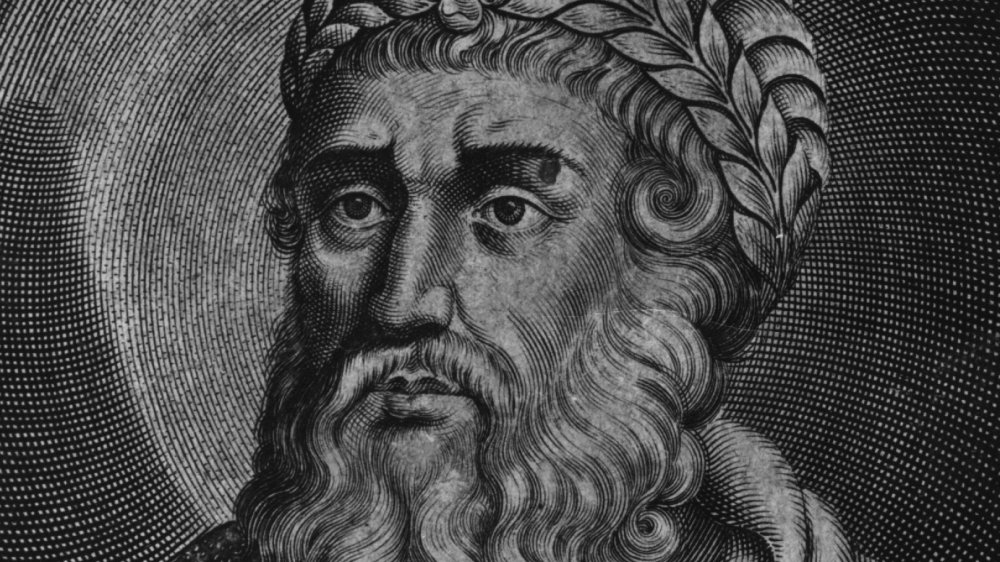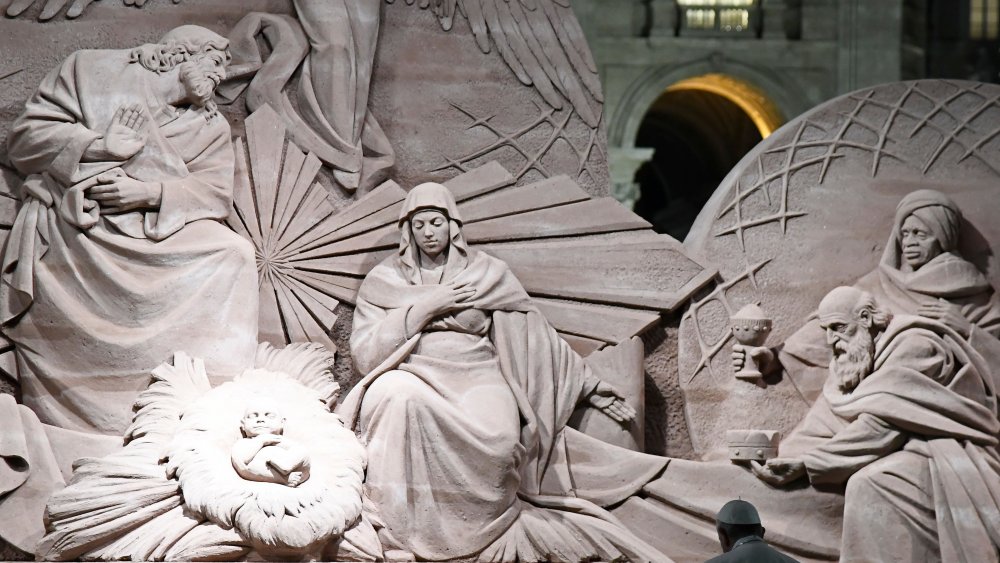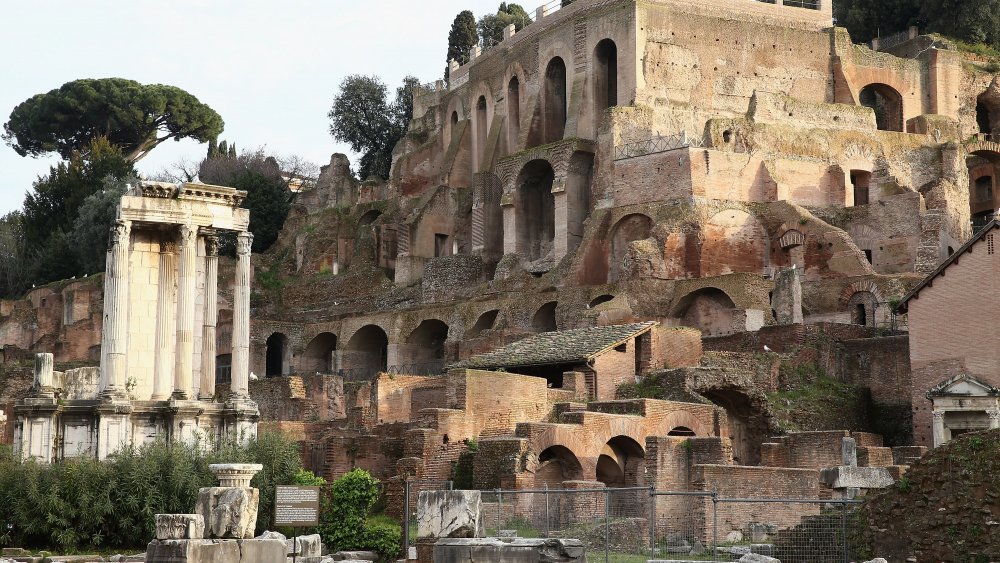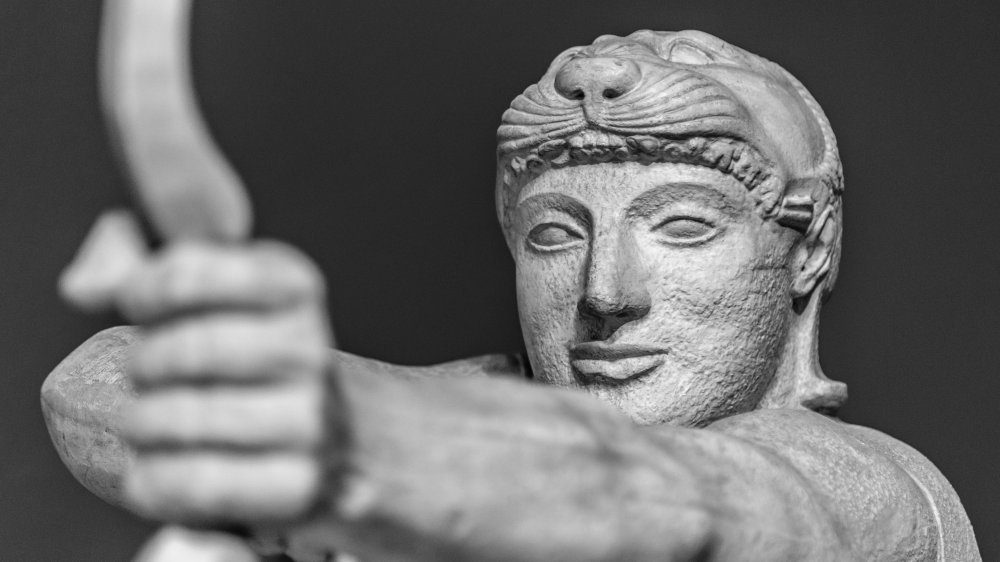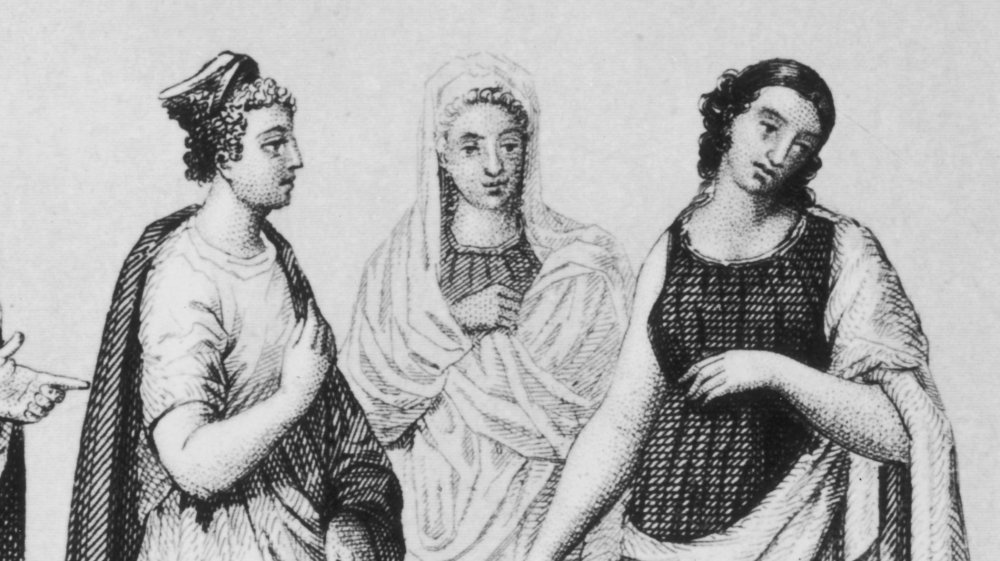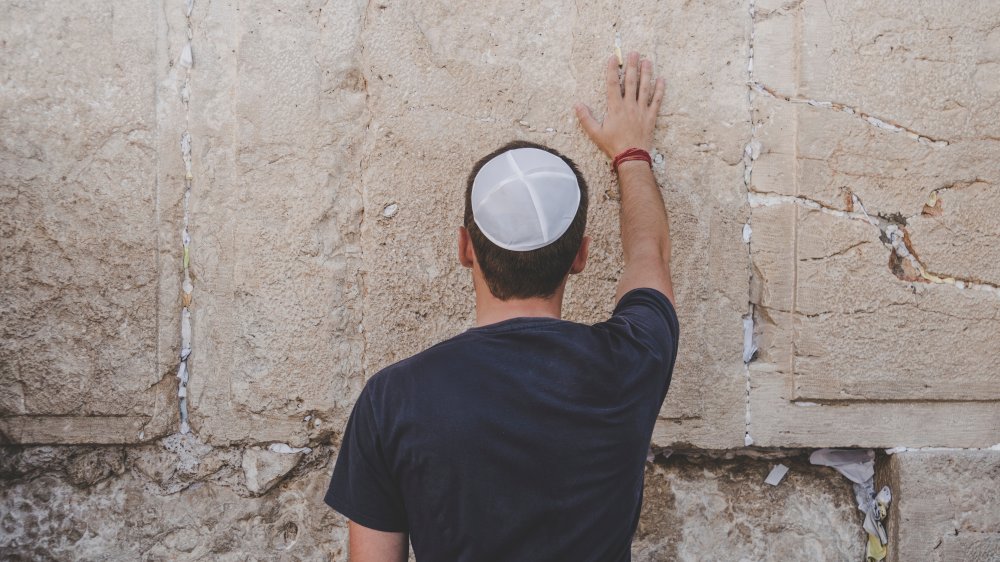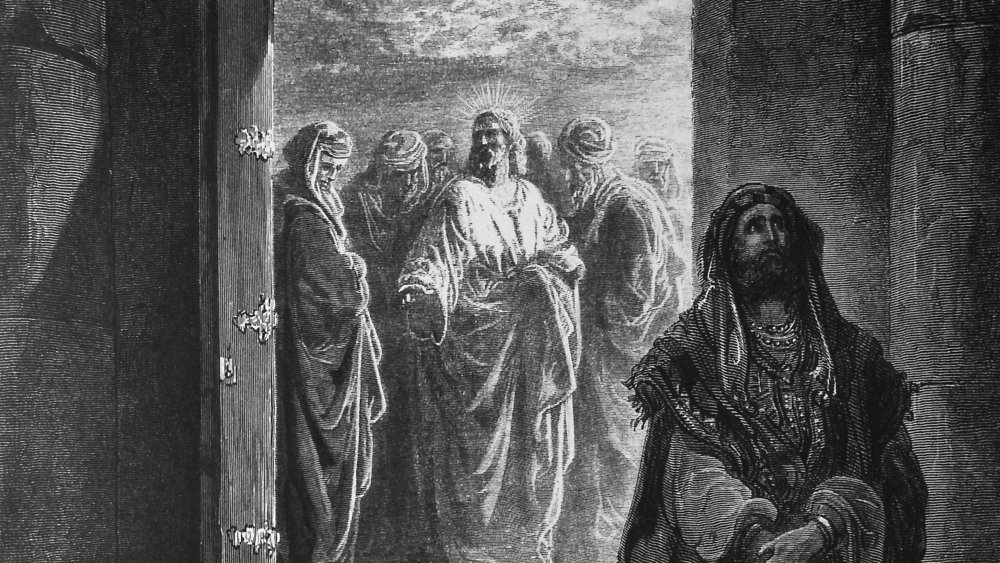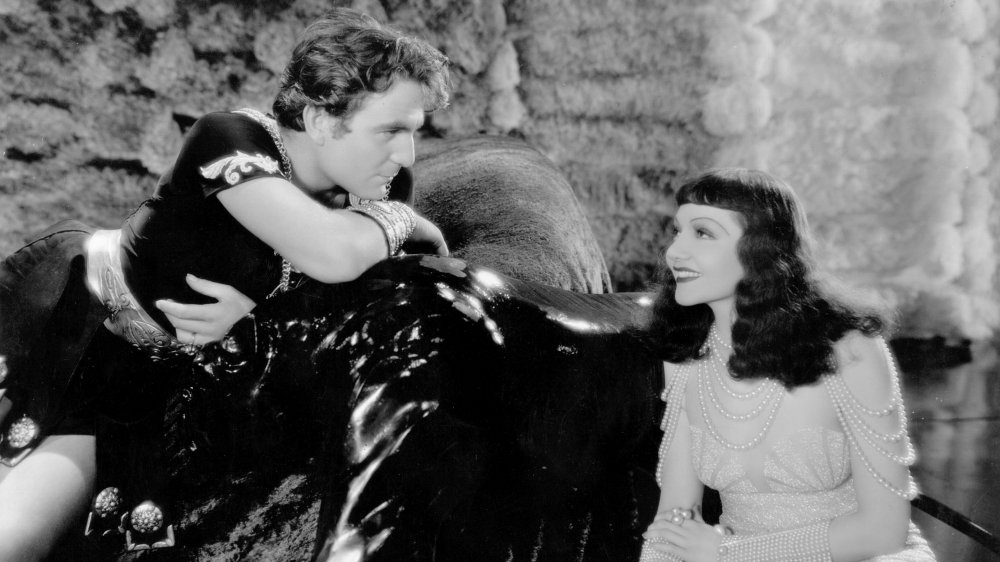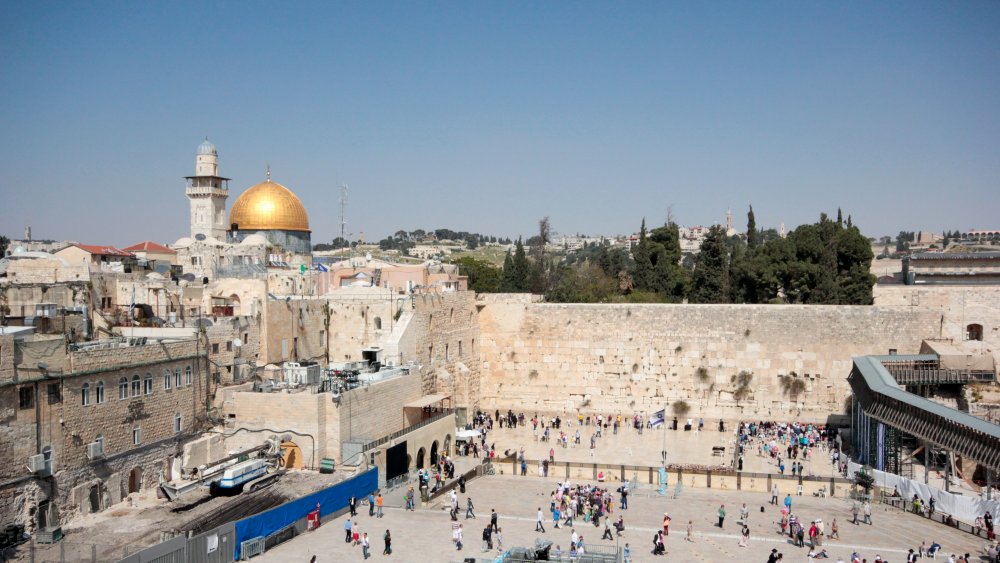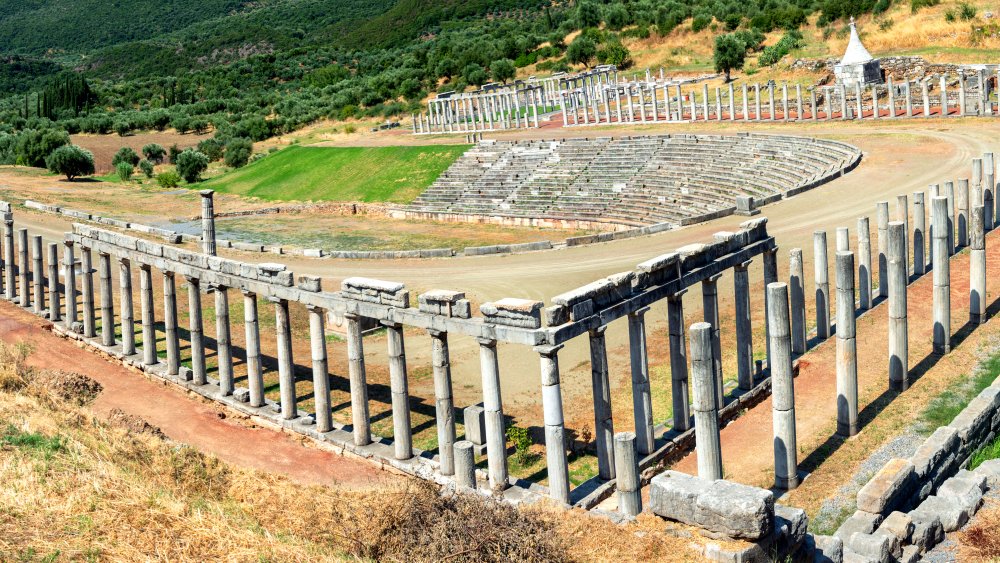The Real Story Of King Herod
King Herod, a.k.a. Herod the Great, is a figure in the Nativity story who doesn't get as much play as, say, Mary and Joseph. But the guy's actually pivotal in the life of Jesus. According to the Bible, his jealousy over the birth of the "King of the Jews" (because Herod thought he had that title) led to a massive slaughter of children. Every male child under 2-years-old was killed, lest they take they take over from King Herod (not unlike Moses's backstory). Only by an angel's interference did Jesus's family get away. But the Massacre of the Innocents (the formal name for his baby-killing spree) is only mentioned in one gospel, and no other records from the time, so there's some doubt it ever really happened.
Still, King Herod is a very interesting character. While he's still a very evil figure (the Bible may actually be downplaying his evil nature), his story is complicated. It is a lot like that of Queen Esther — very emblematic of its time and place. Context is everything. Even if he didn't kill a bunch of small children, that actually pales in comparison to the evil King Herod had definitely already committed.
He may not have killed Jesus (or been the Herod to try it)
Making sense of the Herods in the Bible almost as confusing as keeping the Marys straight. Is this particular guy Herod the Great, or is he the similarly named Herod Antipas, murderer of John the Baptist? Herod was also the name of an entire dynasty. The Encyclopedia Britannica says Agrippa I and Agrippa II were both "Herod" kings, and both were tied to deaths of important biblical figures. This name might just be cursed.
Even if Herod didn't order the deaths of children to try and get Jesus, he still wasn't a nice guy. The literal vs. metaphorical debate is common in biblical studies. It's not meant to be disrespectful of the people who adhere to the Bible as a religious document, but rather it's a topic of intellectual argument among biblical and Talmudic scholars. The Bible doesn't necessarily need to be factual to still be informative about morality and history.
Blame for the disparaging portrait of King Herod lies partly on the historian Josephus, who outright hated him, and he doesn't mention the Biblical baby killing. Still, if the Massacre had happened, it probably would have involved fewer than five deaths because of how small Bethlehem was, possibly not enough to make the history books. According to Live Science, the Massacre of the Innocents was probably a metaphor alluding to past evil deeds King Herod had committed. What had he done that was so bad? Not much, just killed his own children.
Herod wasn't a king as much as a military leader
The problem started, essentially, because calling King Herod a king is a bit of a misnomer. He was a client king, i.e. the person in charge of a particular territory under the rule of Rome. For all intents and purposes, he was basically king of the people he ruled. Your average biblical peasant likely wasn't going to run into the actual emperor in their lifetime.
But King Herod was in a weird and tenuous position. According to Bible Gateway, he ruled over the giant and important territory of Judea. He was in charge of a lot of people in a fairly large plot of land. But he was still Rome's lapdog. He had to kiss up to the emperor at all times and know where the wind was blowing politically (and kiss up to whoever was in power) if he wanted to keep his kingdom. And keeping his Roman overlords happy meant he had to keep things under control in his area and protect what was then the edge of the empire. He conquered territory, built fortresses ... but the local Jewish population never accepted him as their king, and this pissed him off.
King Herod's family was a mess
To call King Herod insecure about his position would be a massive understatement. He wasn't afraid to take out his competition (more on that later). But he was also, perhaps legitimately, suspicious of those closest to him. It didn't help that some of them were monsters.
Things were not great toward the end of King Herod's reign. According to Jewish Encyclopedia, Herod's two marriages produced massive rifts in the family. He'd ditched his first wife for another woman, Mariamne, and his second marriage produced two sons that were very well liked by the populace. But a son from his first marriage, Antipater, hated them and wanted to usurp power. His aunt, Herod's sister Salome (not the same one who had John the Baptist killed) helped him in the plot. King Herod believed the lies the pair told him about his sons and had the two men strangled. But Antipater didn't get to celebrate long. His dad found out about his involvement in the plot and had Antipater killed as well.
In the end, no one inherited King Herod's title as king. His stuff was split up amongst the remaining children — which inevitably ended in even more family fighting.
King Herod married for power and love
King Herod's second wife, Mariamne, belonged to the Hasmonean dynasty. This was the Jewish family that had previously held power over Judea. The marriage was likely to legitimize his place as the new leader of Judea.
But people forget that King Herod had already had a wife, Doris. Livius says that she was from an unknown family in Jerusalem. She probably wasn't the best match politically for King Herod by the time he rose to power, so he sent her away so he could marry someone else. She shows up again in the palace later in his life, but he sends her away again. Yeah, men could just do that back then.
By all accounts, he actually was in love with Mariamne, even though she apparently hated him, probably because he had a couple of her relatives killed. Maybe it could have been a one-sided love story for the ages if Salome wasn't whispering nasty rumors about Mariamne the whole time. Herod eventually had his second wife killed under suspicion that she had used a love potion to make him fall in love with her. To be fair, he was actually sorry about that death.
King Herod had ten wives
First there was Doris, who gave birth to one of his sons. Then there was the princess Mariamne, who was a political marriage but ended in tragedy.
After this, King Herod's marriage track record gets really weird. At this point, he had plenty of sons and thus guaranteed heirs to his throne (until he started killing them). But from there, he married one of his nieces, a cousin, another woman named Mariamne whom he later divorced, a Samaritan woman named Malthace, a woman from Jerusalem named (no joke) Cleopatra, and then three more women that he married all in the same year. We know that the second Mariamne was the daughter of the man whom he had made high priest. It's not too much of a stretch to assume that most if not all of the later eight marriages were for political reasons.
According to Live Science, King Herod justified his polygamy using Jewish texts. He definitely wasn't the first Jewish king to have multiple wives — King Solomon was supposed to have had seven hundred, plus three hundred concubines. Good thing he was rich, right?
King Herod was a practicing Jew
King Herod is quoted in the Bible as asking the Three Wise Men to report back once they had found Jesus, so that he could go and worship him as well. This may have been a ploy to eventually kill Jesus. But it was rooted in the true fact that King Herod practiced Judaism, just like his father and grandfather. TheTorah.com describes how many ritual baths (used to perform cleansing rituals in ancient Judaism) were found in all of King Herod's palaces during excavations. He didn't eat pork, and only used fish sauces made from kosher fish. King Herod also refused to put his face on coins or create statues of himself, citing the Jewish principle of not worshiping visualizations of people.
This liked helped win over some of King Herod's subjects. Richer Jews liked the fact that he brought more stability to the area and didn't mind the extra touches of Roman culture. In a system where they had no choice in who ruled them (and Rome had all the choice), he probably seemed like the best of a bad bunch.
But most of his Jewish subjects doubted Herod's Jewishness. He had an Arab mother, for one thing, and he broke Mosaic Law too much for their liking. He even put a golden eagle, a symbol of Rome, on top of the Temple.
King Herod was insecure because he wasn't Jewish by blood
King Herod's questionable Judaism put him in a difficult situation with his subjects. Ignoring the Arabian half of his family, even the Jewish side were only converts to Judaism. And his marriage to Mariamne, who was from an important Jewish family, didn't quell the problem that non-ethnically Jewish royalty had a lot of power in what was supposed to be a Jewish province. Herod the Great did his best to paint himself as a ruler for everyone in his kingdom, but he couldn't shake distrust from the poorer citizens and the xenophobic Pharisees. Bible readers will know the Pharisees as the group that offered Judas 30 pieces of silver to kill Jesus.
Herod's Jewish subjects were also horrified that he allowed animal combat and decidedly un-Jewish games in their land. Livius says there were rumors that he had plundered important Jewish tombs for treasure.The fact that he was putting mostly Romans in power also didn't help. But arguably, King Herod had to integrate Roman culture in the areas that he ruled. Rome had given him this power and he had to kiss up. But there was definite tension from the culture clash.
All this to say that when he heard whispers about a new "King of the Jews" that wasn't himself, he wanted to stamp that out immediately.
King Herod filled the treasury with his enemies' money
King Herod came by his kinda-kingship by force. He basically conquered Judea on behalf of the Roman empire, and they were so impressed that they let him be in charge. The conquest was so brutal that even Herod thought it went too far, had to bribe his soldiers to stop raping and pillaging Jerusalem. But he wasn't done cleaning house.
Live Science says Herod's father had been straight-up poisoned before he regained control over Judea, and Herod didn't forget it. According to the Jewish Encyclopedia, he executed 45 powerful figures in Judea and took all of their wealth to fill up the state's treasury. He also wasn't afraid to straight-up ransack the stuff of anyone who disagreed with him politically.
The bloodshed continued when, bowing to political pressure, King Herod gave the position of high priest to his teenage brother-in-law Aristobulus. This kid was from the original family that ruled over Judea and proved to be very popular with the people. Herod guessed that he could have a rival for power (or at least a powerful enemy) in Aristobulus, so he had the kid drowned in his tub and bribed his way out of any punishment from his bosses in Rome.
King Herod was Marc Antony's ally (at first)
OK, so this information comes from Jewish sources that wanted to paint King Herod as a complete monster. It's all palace intrigue, and hardly anything can be 100 percent verified.
According to the Jewish Encyclopedia, King Herod wasn't exactly friends with Cleopatra, but they weren't enemies. She had even offered to make him a general in her army. But she was also behind the move to take him to Rome to be questioned for his brother-in-law Aristobulus's death. Antony even "gave" her the district of Jericho, one of the best parts of King Herod's kingdom. He was technically King Herod's boss and higher up in the Roman kingship food chain. What could Herod do? Antony wanted to give his girlfriend a gift, and she happened to want an even bigger kingdom.
All this may have ignited King Herod's self-preservation instincts when he went to go meet with then-emperor Octavian. At this point, Antony was dead (and Cleopatra was about to be). King Herod had been on the side of a now-deceased traitor. He had to think fast. He admitted that he had been Antony's friend. But he also said he could be as good a "friend" to Octavian ... who immediately gave him back all his land and titles. He even scored some of Antony's land. Herod was very good at playing both sides.
King Herod made the Temple a lot nicer
To understand how big a deal this is, you have to understand the importance of the Temple in Jewish culture. It was a big deal for the Jews, who had been chased out of countries, to have a place of worship that couldn't be taken away by anyone. It's still considered sacred to modern Jews in the form of the Wailing Wall, a vestige of the Temple that remains centuries later.
According to Bible Odyssey, the temple that King Herod refurbished was the second temple, the first one was built by King Solomon but had been destroyed by the Babylonians. This was the place where the Ark of the Covenant was kept, and later where Jesus would overturn some tables to protest corruption of the holy space. It was the most important location for Jews in Herod's kingdom, and making it bigger and nicer was a big deal to them.
But King Herod liked building stuff in general. He earned his "the Great" because he started so many beneficial architectural projects during his reign. He built numerous cities and military strongholds. He also gave money to cities like Antioch and Sparta so they could give themselves a glow-up.
King Herod helped save the original Olympics
King Herod may have been on a massive public relations campaign with the refurbishing of the Temple. But when he heard that the Olympics might have to stop due to lack of money, he made a massive donation so they could go on.
This was an easy way to endear him to the Romans in power. But it may also speak to King Herod's ideal of being king of multiple faith groups. After all, as the Times of Israel points out, the Games couldn't happen because the Romans had conquered the Greeks, who went broke and couldn't afford to splurge on sports. But Herod loved anything Greek. To keep the games going, King Herod likely would have had to orchestrate the rebuilding of the original Games site as well as pay for everything involved in the ceremony, from feasts to the winners' statues. Even if they weren't Jews, he was happy to help them out.
Herod was named president of the Olympics for life for his donations, a title the Greeks probably made up just so they could give it to him. Titles are a lot cheaper than paying for the whole Olympics.
King Herod died a horrible, gross death
In the Bible, it's pronounced that King Herod (or someone who was likely him) was eaten by worms for not respecting God quick enough. That's probably metaphorical, but his real death wasn't much better. ABC News reported that he likely died of kidney disease. He complained of stomach pains, suffered seizures, and seemed to never stop itching. The "worms" might have been dry skin, but most likely they were a maggot infestation in a place that today would be covered by an athletic cup. He may have also developed an infection and/or contracted gonorrhea.
Before he died, King Herod unleashed one last petty move: He rounded up all the most prominent men in every village in his region and locked them into the Hippodrome of Caesarea. The Times of Israel identified this as a big Roman-style stadium by the beach that was often home to protests when things got testy. Live Science says King Herod ordered Salome to kill all the village leaders once he died, to make sure that the Jews of his kingdom would mourn him.
But Salome set everyone free once it was certain that Herod died. Then there was such a bad uprising that Rome itself had to send reinforcements. No word on if they were singing, "Ding dong, the witch is dead" the whole time.
